If you were to ask my 4th grade orchestra teacher why he dedicated his life to teaching young children how to play stringed instruments, I assure you his answer would not be, “because it sounds so pretty.” Talking to him later on in life, he would say he loved the change he got to see in children. “You can see something light up, when the kids are really learning and getting into the music.” When kids get immersed in their own world of creating, music makes a difference in their lives. There are many tangible benefits of music for children.
Incorporating music into your child’s education has tremendous benefits, from infancy into adulthood. Don’t worry, you don’t have to be musically inclined yourself in order to encourage music in your child’s life. There are many activities and programs, even ones that won’t break the bank, to help along the way.
Benefits of Music Education For Kids
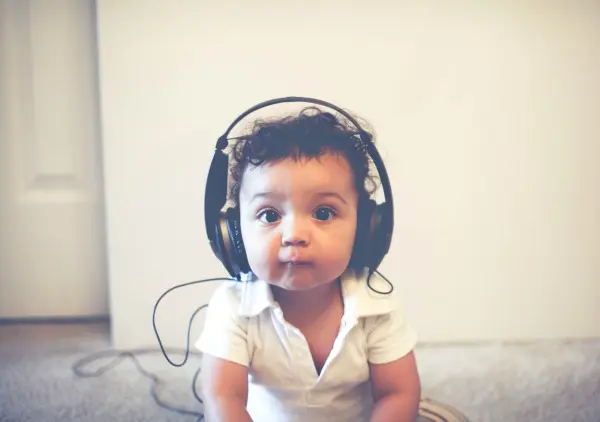
Research shows that musical ability and comprehension is gained most successfully between the window of infancy to age 9. Think of learning to read or play music like learning a language, doing so the older we get becomes increasingly more difficult. What is most important during this time is learning the building blocks of music, the patterns and rhythms. The “types” of music they are exposed to (jazz, r&b, gospel, country music, etc) is similar to picking up an accent. It will become how they understand and hear music. Eventually they will most likely emulate that style when, or if, they play an instrument or sing.
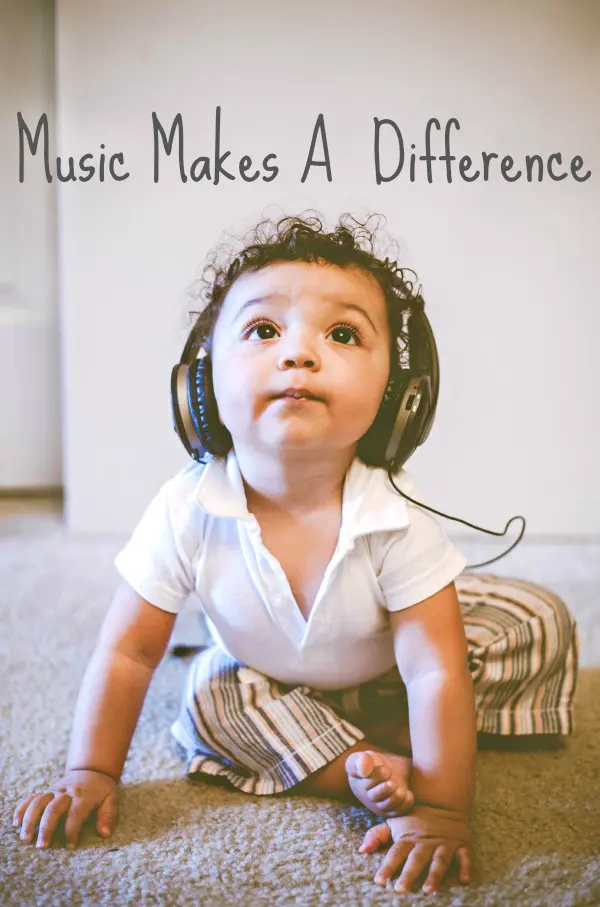
Music Makes A Difference In Growth And Development For Young Children
Incorporating music into your child’s life is not about forcing a musical path for them. Musical is beneficial and therapeutic to everyone (yes, sports enthusiast included. It doesn’t HAVE to be a war , sports vs. music, in fact they actually work beautifully together.) Simply incorporating music into everyday play has benefits.
- Singing, listening, and dancing along with music from a young age will help prepare young children for formal learning later on.
- Simple play with musical instruments promotes fine motor skill development in infants and toddlers. It engages eyes, ears, as well as big and small muscles, engaging multiple skill sets that make the brain work harder.
- Listening to songs and singing can actually help young children who are struggling with speech development.
- Music improves memory and cognitive function. Songs often help facilitate everyday chores and remembering fundamental basics (ABC’s and counting).
- Creative and emotional outlet, even for young children is important, and can be engaged with musical play time
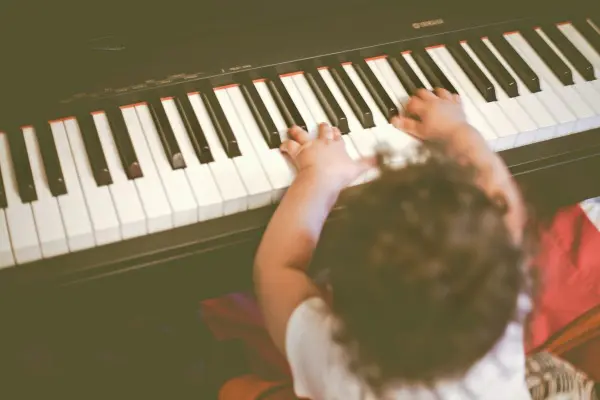
Structured Music Education Offers More Benefits
Encouraging your child to learn an instrument or enrolling them in lessons, singing included, has extra benefits as well:
- Increased discipline and patience. Two qualities that are increasingly lacking in our society. Becoming proficient at reading music and playing require a lot of consistent practice and dedication.
- The process of learning and “mastering,” (age-appropriately), a song or instrument helps shape learning confidence. Being able to perform for parents and piers teaches that there is a pay-off to working hard towards a goal.
- Children who play an instrument typically do better in the subjects of reading and math
- Children learning an instrument or singing at school can help them open up socially. Long-lasting friendships are often built through these disciplines as they are working towards achievement as a team and spend a lot of time together, even outside of regular school hours.
- Young adults participating in music programs are less likely to get into trouble, use drugs or alcohol, and have a higher graduation rate.
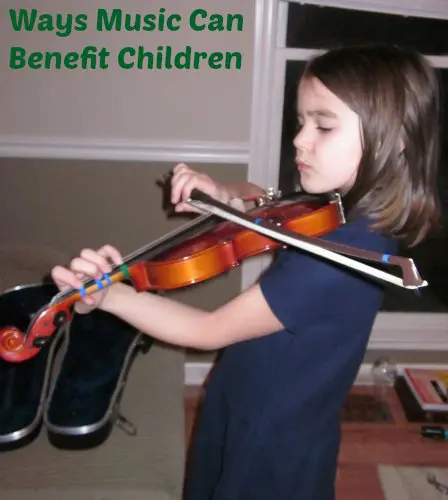
Music Can Benefit Children by Boosting Brain Activity
Providing your child with exposure to music will offer him or her advantages mentally. Music is far more effective and engaging (where the brain is concerned) than the television. Professionals have proven that children that have been exposed to positive music activities turn out to have a much higher academic achievement level of success than those children who weren’t. This is because music stimulates the brain, and this stimulation occurs in the same areas where math, reading and emotional development all takes place. Let’s not forget, the discipline it takes to practice an instrument on a regular basis nurtures a strong work ethic that will prove valuable years down the line.
Music Education Benefits Children By Improving Memory
It is also proven that children remember things they have learned through music far better than those they have learned otherwise. When your child participates in musical activities, lessons and games, etc. their ability to learn is enhanced greatly. The younger they are exposed to music the better their memory will be too. See, music is a stimulator for several brain patterns. Now that is something to think about.
The Benefits of Music Education Include Imparting Confidence
Music is excellent for building your child’s confidence and social skills. If you can get your child interested in music early and he or she decided to play an instrument then they are guaranteed to spread their wings; your little one will feel a proud sense of achievement as he or she learns new music, find artistic ways for self-expression and, when taking communal lessons, will find healthy hobbies to share with others and foster community spirit. Plus, kids that are frequently exposed to music are believed to have higher levels of empathy and ability to place themselves in other shoes, an attribute that will undoubtedly prove helpful when making friends.
Music Can Benefit Children By Providing an Outlet For Release and Creativity
You never want to think about your child being disconnected or withdrawn, but it happens, and this is can be especially true in tweens and teens. After all, this is a time in which they are dealing with those crazy hormones and questions of identity. Music is a release and, in some cases, a lifeline for children of all ages. Oftentimes, music can express what we cannot verbalize and it can be a healthy outlet for your child’s frustrations.
Music Teaches Patience
Finally, practicing music teaches your child patience, and that is a gift in these busy times. Still, the most precious benefit of learning an instrument is the fun and fulfilling melodies that your children can relax and produce while you lovingly (and thunderstruck) watch their abilities quickly show. I love to watch my daughters’ performances – one of my favorite things about music as a mom, is the creativity I have seen it cultivate in my children. That is priceless.
Ways to introduce music to your child
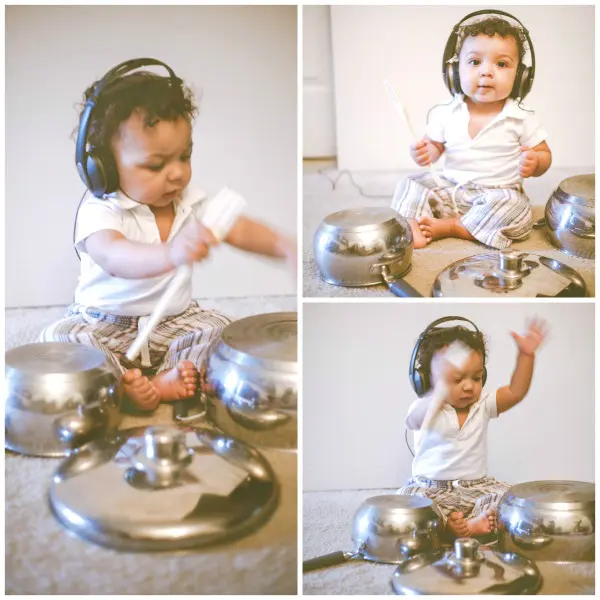
Private Lessons
Private lessons may be ideal for ultra-focused learning of a musical instrument, but they can come with a hefty price tag. They are certainly the best option for developing serious musical talent. However, not all children will want to pursue the instrument of choice later on in life. In this case, less expensive options may be best for unsure kids.
Music Activities For Children
Young children don’t need any fancy equipment to explore and experience making music. Here are some tips and activities that will help allow music to create a difference in your child’s life:
- Take advantage of travel time and morning/night routines to have music playing for your child. Sing lullabies when soothing or make songs to go along with daily actives (tying shoes, bath time, cleaning up, etc) Don’t worry, babies are pretty nonjudgmental when it comes to your singing voice. You can’t beat the classics like good ol’ Raffi songs, either. There are tons of free online music sources for kids.
- You’d be surprised the amount of things around the house kids can use to make “music.” Better yet you can tailor make-shift instruments to your sanity level. It’s a classic, but pots and pans make a perfect, indestructible (and bearable) drum set. Kleenex boxes and rubber bands make a great guitar/violin. Younger children can make pretty cool DIY instruments for kids! You can also by sturdier, simplified musical instruments for kids and/ or used instruments to keep the prices down.
- Check with your local orchestra about reduced or free kid’s shows. Many times orchestras will give special performances in the morning just for kids at a reduced price or completely free. What’s even better is that you don’t have to worry about any fussiness ruining an adult evening out during the kid-friendly show.
- If you’re affiliated with a church, check with their children’s ministry department. Often they have youth choirs set-up, or opportunities for the youth to sing with the adults periodically.
Conclusion
If your child is new to playing an instrument and is between the ages of 4-7, it may be wise to purchase lighter, cheaper instruments. This will help gauge your child’s interest levels before splurging on a grand piano or expensive French horn. Find affordable musical instruments like recorders for younger kids. These may pique their curiosity and have them itching to be the next Mozart.
Following this stage, consider renting or buying a used instrument. Some stores or programs through schools allow you to rent instruments, or rent-to-own for your child. This may be a better option before buying an instrument out right. It is a smart choice if you want to give your child a trial period first. Or if your child may need to graduate to a larger sized instrument as they grow. This is also a good way to allow children to determine whether or not the clarinet or xylophone is really for him or her before fully committing.
Just remember, a musical inclination and passion is an asset that will serve your child for a lifetime. Identifying, shaping and nurturing a love of music will be an ongoing process for both you and your children. How has music made a difference in your child’s life? Let us know!
Related Post:
How To Get Kids To Practice Music
